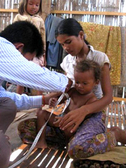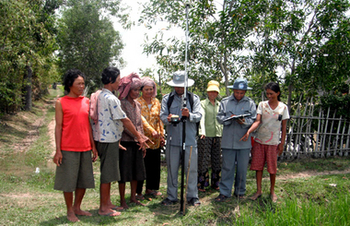Contribution to securing land rights
Project description
Title: Contribution to securing land rights in Cambodia
Commissioned by: German Federal Ministry for Economic Cooperation and Development (BMZ)
Country: Cambodia
Lead executing agency: Ministry of Land Management, Urban Planning and Construction
Overall term: 2011 to 2016

Context
Political stability, economic growth and social development depend on the existence of legal security for land use and socially-balanced access to land, with the government undertaking comprehensive land planning. Cambodia has already made progress with a land reform programme supported by international donors, but in many cases land rights remain unresolved. For lack of other options, some people settle on government land without permission, leading to conflicts over land and forced displacement. Mechanisms for granting land to landless people have not yet been fully implemented.
Objective
The proportion of poor people in rural and urban areas of Cambodia who have legally secure access to land has increased. Land is granted in a socially balanced way within the context of an overall land-planning concept.
Approach
The project supports the Cambodian partner ministry in developing institutions for the land sector that are transparent and respond to citizens’ needs, and that focus on securing the land rights and human rights of the landless population, women, indigenous groups and informal settlers. The project’s core services are to provide advice and advanced training at national level, and within the authorities at provincial and district level, to pilot new approaches and to support the activities of local NGOs. Support is also given to introducing new land surveying technologies.
Results achieved so far
The partner ministry is in a position to draw up policy documents and legal texts which have undergone public consultation processes and conform with national law and Cambodia’s obligation to uphold human rights. Thus, the legal framework for implementing land reform has been established and the political course determined.
Today more than 1,000 Cambodian surveyors are working efficiently and in conformity with the law to systematically carry out the initial land registration. More than two million private land property titles have been issued. Three indigenous communities have received collective land titles. Efficient structures provide a basis for accelerating land registration.
Municipal counsellors have received training in land conflict settlement. The provincial Cadastral Commissions have been granted further powers, improving the population’s access to effective out-of-court settlements in the case of conflicts over unregistered land.
In the city of Battambang, with approximately a quarter of a million inhabitants, a master plan has been developed with the participation of the population. This has already been implemented in some sectors (road and bridge building, protection of monuments, green areas). These activities opened the way for involvement in informal settlements, improving cooperation between the municipal administration, civil society and settlement representatives. Legal and practical solutions have already been found for four settlements, enabling them to remain on what was previously state land.

Roughly 1,600 landless households have been granted state land in the form of social land concessions. The authorities are able to carry out the procedures required to administer this decision. The project has supported households in using the land granted in a productive way, thus raising their income.